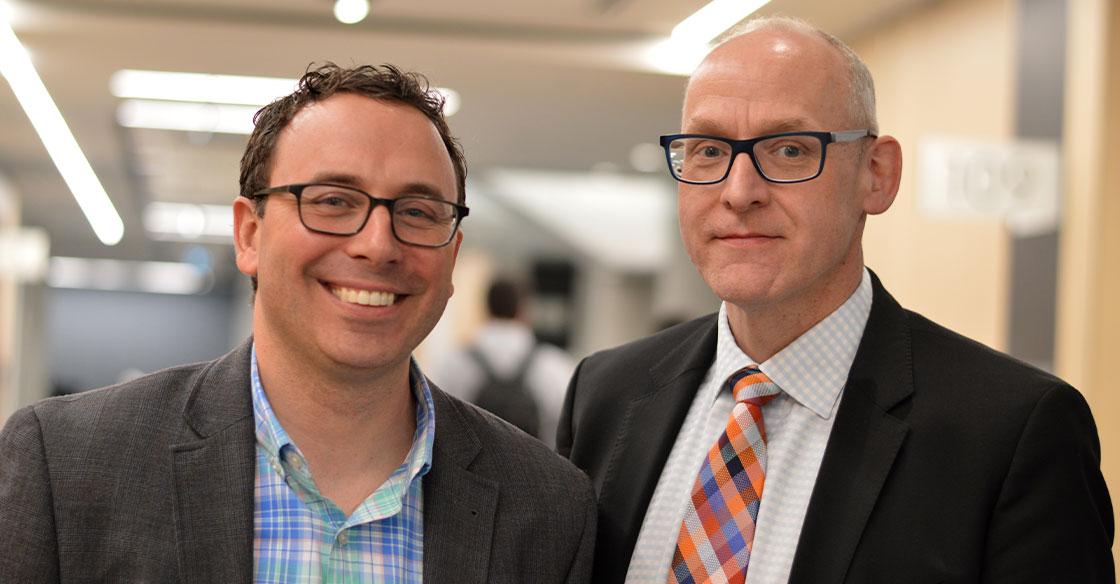
Originally published on qe2times.ca.
When most people hear the term artificial intelligence (AI), they have a futuristic image ripped straight from the latest action/sci-fi movie in which robots take over the world. But nothing is farther from the truth, according to Dr. Leonard D’Avolio, an assistant professor at Brigham and Women’s Hospital at Harvard Medical School.
Dr. D’Avolio was invited to be a keynote speaker at the Dalhousie Medical Research Day in April 2019 by Dr. Michael Dunbar, an orthopaedic surgeon at the QEII Health Sciences Centre, director of Dalhousie University’s Department of Surgery Research and QEII Foundation Endowed Chair in Arthroplasty Outcomes. Sponsored by the QEII Foundation, Dr. D’Avolio spoke about big data and building the machine learning system.
Dr. D’Avolio is a software engineer and the co-founder of a performance improvement organization called Cyft, which uses data and AI to improve clinical care and operations. He says there is nothing to fear with AI and big data. In fact, if anything is to change and improve in today’s healthcare system, we will need to fully embrace this inevitable shift in technology.
“What area of health care wouldn’t be affected by the opportunity to learn faster, better, in real time?” -Dr. Leonard D’Avolio
“Unfortunately, the way it is positioned now, it is sort of ‘robot versus man’ and the stage is set for AI to go to war against doctors to revolutionize health care,” he says. “But AI is neither artificial, nor is it intelligent. It’s just math.”
Dr. D’Avolio, who has family connections in Nova Scotia, offers the example of maps.
“In the past, we had paper maps. You could pull it out of your pocket to understand the lay of the land,” he says. “Now we have Google Maps. We still have maps — the underlying data — but when AI and big data come together, they give us new abilities.”
This data goes beyond simply allowing us to see which roads connect. We can now see what the traffic is like in real time and if you take route A versus route B, which route will you get there faster.
“This is a really profound opportunity. It’s a new capability — not a new tool, not a new technology,” he explains. “The super power that we now have access to, and we are now just beginning to scratch the surface of, is that we can learn in ways that were never before possible.”
“What area of health care wouldn’t be affected by the opportunity to learn faster, better, in real time?”
And that is really what it boils down to, according to Dr. Dunbar. “The department of surgery is moving forward to start looking at the data we have already collected and see if we can make better use of it.”
In order to do this, Dr. D’Avolio says it is imperative to ask the right people the right questions. He acknowledges researchers are working on some very interesting problems, but it’s in their nature to frame those problems in terms of what matters to them. In order to make meaningful change, researchers need to frame problems in terms of what matters to those who control access to the data needed.
Dr. D’Avolio gives the example of accidental death due to medical error.
“In the U.S. in 2015, researchers suggest on the lower end that number was 210,000 and on the higher end it was 400,000, but nowhere in the debate did anyone ask the question, ‘why don’t we know this number?’”
In the airline industry, every near-miss between airplanes is tracked. “We pay really close attention when 100 people die in an airplane, yet we don’t count whether it was 210,000 or 400,000 when they die in health care,” he said.
Part of the issue is we live in a culture where we are programmed to protect patient privacy, but the question then becomes, at what cost?
“Even if we go so far as to create registries, we go out of our way to de-identify them,” says Dr. D’Avolio. “So once we know something that can help you, we have no way to know if you are the person we can help.”
The data is there and is readily available to start answering the three fundamental questions for improving anything: What are we doing? Is it working? What should we be doing?
Dr. Dunbar adds that the QEII is ahead of other provinces in some ways because it is the leading hospital in Atlantic Canada, and as such is a “living health lab.”
“I think there are some good things that can be done with respect to understanding some of the outcomes that are already in front of us,” says Dr. Dunbar.
He says the QEII also has an amazing opportunity to potentially design products, specifically in analytics. “That takes longer, but I think we can and should start. We have already tested the water and the pathway but what I am interested in, as part of the department of surgery, is making this happen for all of the divisions.”
Dr. Dunbar says ultimately, this data can answer the burning question on the minds of all Nova Scotians — what can we do better?